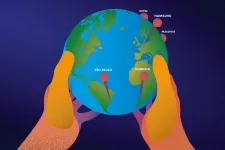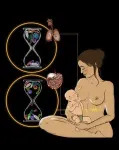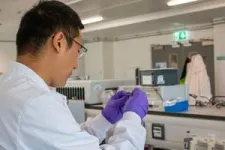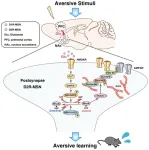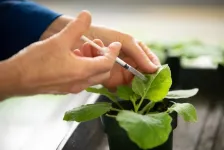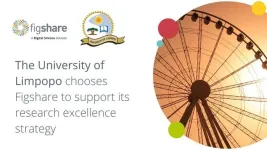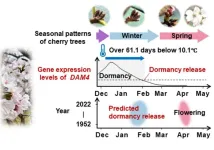(Press-News.org) Climate change is forcing people to adapt to changing environmental conditions. But what really makes the difference is how they do it. The recently published Hamburg Climate Futures Outlook 2024 by 73 authors shows that, in the long run, only sustainable adaptation can succeed. This global assessment by University of Hamburg’s Cluster of Excellence Climate, Climatic Change, and Society (CLICCS) also provides practical recommendations.
“Successfully adapting to the impacts of climate change is just as difficult and challenging as reducing emissions of every kind,” says Anita Engels, Professor of Sociology and leading author of the assessment. “Yet, both are needed.”
On the basis of nine case studies in diverse geographical contexts, including Nepal, Namibia, Lower Saxony (Germany), São Paulo, Ho Chi Minh City, Hamburg, North Frisia (Germany), Taiwan, and the Maldives, CLICCS researchers have analyzed a broad range of adaptation measures in response to climate risks. None of the cases assessed can currently be regarded as exemplifying a sustainable adaptation strategy. However, Hamburg, North Frisia, and Ho Chi Minh City were able to demonstrate initial approaches to transformative adaptation. The research teams, which included people from the contexts under investigation, furthermore identified key conditions for sustainable climate adaptation.
Developing sustainable measures together with the local populace
“Sustainability is not just a ‘nice-to-have’”, says Beate Ratter, Professor of Geography and author of the assessment. “When adaptation isn’t sufficiently thought through, the side-effects can cancel out the successes.” For example, poorly chosen coastal protection measures might help combat flooding but can, in the long run, lead to the loss of stabilizing sediments or harm sheltering coral reefs. Similarly, forests that are restored with monocultures are especially vulnerable to pest infestations and fires.
The study assesses the quality of adaptation measures in three categories. The first stage involves direct responses to crises like flooding or drought (coping). The measures in the second stage are more forward-thinking. Preventive adaptation measures are pursued step by step in order to avoid or mitigate negative climate impacts in the near future (incremental). The third stage, sustainable adaptation, calls for redefining structures and processes – a transformation. These measures produce long-term effects, reduce risks, and are jointly shaped and implemented by the local populace (transformative). They produce as few additional emissions as possible and are oriented on the UN’s Sustainable Development Goals (SDGs), so as not to do harm elsewhere. For instance, they preserve biodiversity and conserve natural resources.
Climate variability and climate change can add up
Adaptation is urgently needed because the combination of climate change and natural climate variability is already having pronounced effects on ecosystems and economies, as the latest CLICCS climate simulations show. “In the future, extreme weather events could also occur in combination or clusters,” says Prof. Jochem Marotzke, a climate researcher at the Max-Planck-Institute for Meteorology and another of the assessment’s authors. “That means greater risk with potentially devastating effects. We need to take measures to prepare as soon as possible.”
At the same time, CO2 emissions need to be rapidly and consistently reduced. But the world is making little headway. Back in 2021, CLICCS first identified the ten key social drivers relevant in this regard. Three in particular are currently standing in the way of meeting the targets set out in the Paris Agreement: corporate strategies, consumer trends, and insufficient divestment, that is, insufficient withdrawal of investments in fossil fuels. “Once again, we’re seeing massive investments in oil, gas, and coal,” says Anita Engels. “But the financial betting would have to point in another direction. Investors would have to be convinced that, in the long run, their investments in fossil fuels just don’t pay off anymore.” Here, the only remedy consists of legally binding regulations and political conditions established by individual countries and in connection with the United Nations negotiations on climate change.
Turning up the pressure to turn away from fossil fuels
What can individual societies do? According to the analysis, social movements can push political decision-makers and companies to set more ambitious climate targets – through support or pressure. Emitters also need quantifiable goals and clear obligations to reduce greenhouse gases, which in turn are implemented and monitored. Only then can the urgently needed qualitative leap in climate protection be achieved. Climate litigation can initiate and accelerate these processes. Further, when societies achieve a higher level of social justice, this increases their chances of successfully implementing climate protection and adaptation alike. Lastly, corresponding strategies should be developed together with the local populace, as their local knowledge, experience, and commitment can substantially contribute to the measures’ success.
****************
Publication: Engels, Anita; Jochem Marotzke; Beate Ratter; Eduardo Gonçalves Gresse; Andrés López-Rivera; Anna Pagnone; Jan Wilkens (eds.); (2024): Hamburg Climate Futures Outlook 2024. Conditions for Sustainable Climate Change Adaptation. Cluster of Excellence Climate, Climatic Change, and Society (CLICCS). transcript Verlag, Bielefeld (Germany).
https://doi.org/10.14361/9783839470817
Downloads:
Key visual (graphic, jpg)
Assessment of the case studies (graphic, jpg)
The full study and further material for download:
https://www.cliccs.uni-hamburg.de/publications/hamburg-climate-futures-outlook.html
The Hamburg Climate Futures Outlook is released annually. It analyzes physical and social dynamics and assesses which climate futures are not just possible, but plausible.
73 researchers from the Cluster of Excellence CLICCS were contributing authors to the Hamburg Climate Futures Outlook 2024. They hail from various disciplines of the natural and social sciences, economics and law. 28 reviewers from Germany and abroad checked their work.
The University of Hamburg’s Cluster of Excellence Climate, Climatic Change, and Society (CLICCS) is supported by the German Research Foundation (DFG). Based at the University’s Center for Earth System Research and Sustainability (CEN), it works in close collaboration with eleven partner institutes, including the Max Planck Institute for Meteorology in Hamburg, the Helmholtz Centre Hereon and the German Climate Computing Center.
Contact:
Prof. Anita Engels
University of Hamburg
Center for Earth System Research and Sustainability (CEN)
Cluster of Excellence “Climate, Climatic Change, and Society” (CLICCS)
Tel: +49 40 42838-3832
Email: anita.engels@uni-hamburg.de
Prof. Beate Ratter
University of Hamburg
Center for Earth System Research and Sustainability (CEN)
Cluster of Excellence “Climate, Climatic Change, and Society” (CLICCS)
Helmholtz Centre Hereon
Tel.: +49 40 42838-5225
Email: beate.ratter@uni-hamburg.de
Prof. Jochem Marotzke
Max Planck Institute for Meteorology
Cluster of Excellence “Climate, Climatic Change, and Society” (CLICCS)
Tel: +49 40 41173-440
Email: jochem.marotzke@mpimet.mpg.de
Stephanie Janssen
University of Hamburg
Center for Earth System Research and Sustainability (CEN)
Cluster of Excellence “Climate, Climatic Change, and Society” (CLICCS)
Public Relations / Outreach
Tel: +49 40 42838-7596
Email: stephanie.janssen@uni-hamburg.de
END
Global assessment: How to make climate adaptation a success
Hamburg Climate Futures Outlook 2024 - new study out now
2024-09-19
ELSE PRESS RELEASES FROM THIS DATE:
The African Engineering and Technology Network signs eighth university partner
2024-09-19
Carnegie Mellon University Africa announced today that the African Engineering and Technology Network (Afretec) has signed its eighth university partner, Al Akhawayn University. The network, launched in 2022, provides a vehicle for technology-focused universities in Africa to engage in deep collaboration to drive inclusive digital growth, create technology development and job growth, and shape policy change.
Afretec Network members span the entire continent and include Carnegie Mellon University Africa, the American University in Cairo, Université Cheikh ...
Researchers awarded $1.14M to use artificial intelligence to determine best rectal cancer treatment strategy
2024-09-19
CLEVELAND—With a new four-year, $1.14 million grant from the U.S. Department of Veterans Affairs, researchers at Case Western Reserve University and the Louis Stokes Cleveland VA Medical Center, will use artificial intelligence (AI) to determine the best personalized treatment for Veterans with rectal cancer.
Colorectal cancers are the third-most common type of cancer in military personnel, affecting up to 8% of Veterans and 5% of active-duty Service members, according to the American Cancer Society (ACS). More than 152,000 patients in the United States will be diagnosed with colorectal cancer in 2024, with more than 46,000 localized ...
A new ventilator-on-a-chip model to study lung damage
2024-09-19
COLUMBUS, Ohio – For the first time, scientists are able to directly compare the different kinds of injury that mechanical ventilation causes to cells in the lungs.
In a new study, using a ventilator-on-a-chip model developed at The Ohio State University, researchers found that shear stress from the collapse and reopening of the air sacs is the most injurious type of damage.
This miniature “organ-on-a-chip” model simulates not only lung injury during mechanical ventilation, but also repair and recovery, in human-derived cells in real time, said co-lead author ...
Enrollment of undocumented students at California universities dropped from 2016 to 2023
2024-09-19
Enrollment of low-income, undocumented students declined by half at University of California and California State University campuses from 2016 through the 2022-23 academic year, according to a new study by the University of California Civil Rights Project at UCLA and UC Davis School of Law.
The paper, “‘California Dreamin’: DACA’s Decline and Undocumented College Student Enrollment in the Golden State” is believed to be the first to report on data collected during an era marked by increasing limitations on DACA, or Deferred Action for Childhood Arrivals.
Further, researchers found, for UC and CSU low-income undocumented ...
Gaining insights into the chemical basis of aversive learning
2024-09-19
One of the things that makes brains so incredibly difficult to understand is their ability to adjust and adapt. Our learning experiences can set off complex signaling cascades that reshape neurons—and their synaptic connections—at the cellular level. For example, in mammals, scientists have established that activation of the N-methyl-D-aspartate receptor (NMDAR) and the ensuing calcium ion (Ca2+)-dependent signaling cascade is essential for postsynaptic remodeling and learning. As one might reasonably expect, ...
Revolutionary visible-light-antenna ligand enhances samarium-catalyzed reactions
2024-09-19
Samarium (Sm), a rare earth metal, is important to organic chemists because of the ability of its divalent compounds to efficiently perform single-electron transfer reductions. Samarium iodide (SmI2) is moderately stable and can operate under mild conditions at room temperature, making it highly useful for producing pharmaceuticals and biologically active materials. However, most reactions require SmI2 in quantities equal to or greater than the stoichiometric amount and necessitate the use of harmful chemicals, making the process resource-intensive and expensive to manage.
Several approaches have been studied to reduce ...
Stopping plants from passing viruses to their progeny
2024-09-19
Scientists have learned how plants keep viruses from being passed to their offspring, a finding that could ensure healthier crops. The discovery could also help reduce the transmission of diseases from mothers to human children.
Plant viruses are often able to spread from one country to another through the seed trade. As a result, parent-to-progeny disease transmission is of global concern.
“Viruses can hide in seeds for years, making this one of the most important issues in agriculture,” said UC Riverside distinguished professor Shou-Wei Ding in the Department of Microbiology and Plant Pathology. Ding is corresponding author of a new paper about the ...
NIH awards $2.8M to Rice, Baylor College of Medicine for research on acute respiratory distress syndrome
2024-09-19
HOUSTON – (Sept. 19, 2024) – Rice University and Baylor College of Medicine have received $2.8 million in funding from the National Heart, Lung, and Blood Institute (NHLBI), a division of the National Institutes of Health (NIH), for research on reducing inflammation and lung damage in acute respiratory distress syndrome (ARDS) patients.
The study, titled “Cell Based Immunomodulation to Suppress Lung Inflammation and Promote Repair,” will be co-led by Omid Veiseh, a professor of bioengineering and faculty director of the Rice Biotech Launch Pad, and Ravi Kiran Ghanta, a professor of surgery at Baylor. ...
The University of Limpopo chooses Figshare to support its research excellence strategy
2024-09-19
Figshare, a leading provider of institutional repository infrastructure that supports open research, is pleased to announce that the University of Limpopo has chosen Figshare to facilitate the collection, management, sharing and preservation of its research data.
The University of Limpopo – one of the top public universities in South Africa offering undergraduate and postgraduate qualifications, and a variety of short learning programmes – will become the 20th institution in the country using Figshare as their data repository.
Using ...
A new forecasting model based on gene activity predicts when Japan’s cherry buds awake from dormancy
2024-09-19
Fukuoka, Japan – Japan in spring is famous for its cherry blossoms, or sakura, which begin flowering in the southern region of Kyushu and blaze upwards to the remote north of Hokkaido. The most abundant cherry tree cultivar, Somei Yoshino, is the iconic symbol of spring, as the cloned trees flower simultaneously at each site, creating a fleeting explosion of white-pink blossom that enraptures locals and tourists alike. The flowering forecasts of Somei Yoshino are poured over for months before flowering, as visitors plan their trips and locals ...
LAST 30 PRESS RELEASES:
Tiny bubbles, big breakthrough: Cracking cancer’s “fortress”
A biological material that becomes stronger when wet could replace plastics
Glacial feast: Seals caught closer to glaciers had fuller stomachs
Get the picture? High-tech, low-cost lens focuses on global consumer markets
Antimicrobial resistance in foodborne bacteria remains a public health concern in Europe
Safer batteries for storing energy at massive scale
How can you rescue a “kidnapped” robot? A new AI system helps the robot regain its sense of location in dynamic, ever-changing environments
Brainwaves of mothers and children synchronize when playing together – even in an acquired language
A holiday to better recovery
Cal Poly’s fifth Climate Solutions Now conference to take place Feb. 23-27
Mask-wearing during COVID-19 linked to reduced air pollution–triggered heart attack risk in Japan
Achieving cross-coupling reactions of fatty amide reduction radicals via iridium-photorelay catalysis and other strategies
Shorter may be sweeter: Study finds 15-second health ads can curb junk food cravings
Family relationships identified in Stone Age graves on Gotland
Effectiveness of exercise to ease osteoarthritis symptoms likely minimal and transient
Cost of copper must rise double to meet basic copper needs
A gel for wounds that won’t heal
Iron, carbon, and the art of toxic cleanup
Organic soil amendments work together to help sandy soils hold water longer, study finds
Hidden carbon in mangrove soils may play a larger role in climate regulation than previously thought
Weight-loss wonder pills prompt scrutiny of key ingredient
Nonprofit leader Diane Dodge to receive 2026 Penn Nursing Renfield Foundation Award for Global Women’s Health
Maternal smoking during pregnancy may be linked to higher blood pressure in children, NIH study finds
New Lund model aims to shorten the path to life-saving cell and gene therapies
Researchers create ultra-stretchable, liquid-repellent materials via laser ablation
Combining AI with OCT shows potential for detecting lipid-rich plaques in coronary arteries
SeaCast revolutionizes Mediterranean Sea forecasting with AI-powered speed and accuracy
JMIR Publications’ JMIR Bioinformatics and Biotechnology invites submissions on Bridging Data, AI, and Innovation to Transform Health
Honey bees navigate more precisely than previously thought
Air pollution may directly contribute to Alzheimer’s disease
[Press-News.org] Global assessment: How to make climate adaptation a successHamburg Climate Futures Outlook 2024 - new study out now
